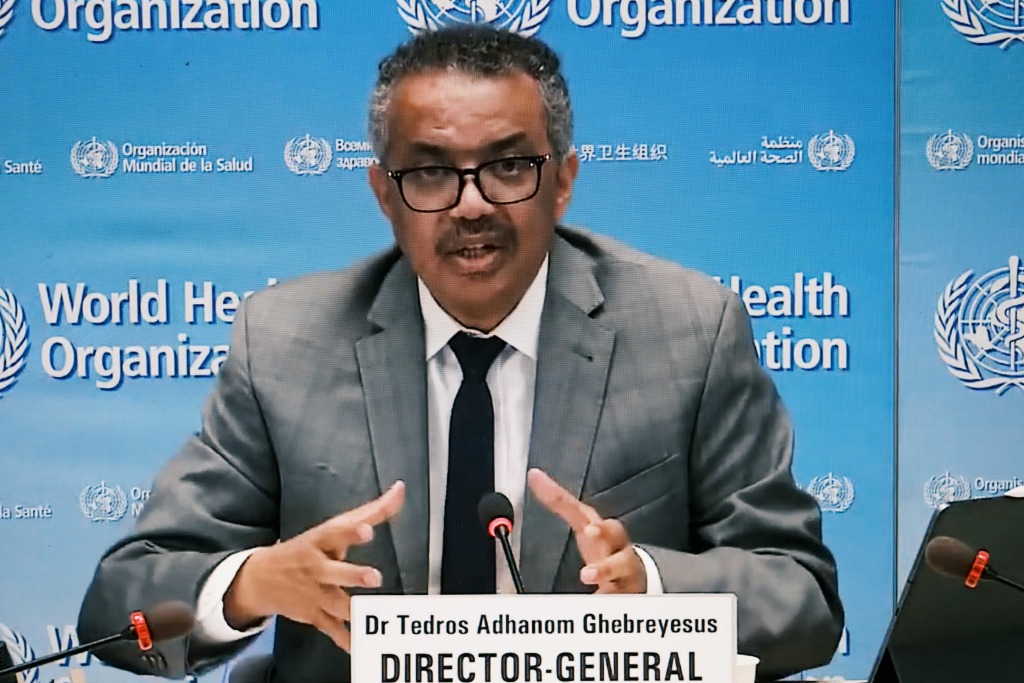BEIJING, July 22 (Xinhua) -- The World Health Organization's Emergency Committee met again on July 21 to study the current monkeypox outbreak and will assess whether the epidemic constitutes a "public health emergency of international concern", that is, the highest level of warning issued by WHO.
Some public health experts believe that monkeypox outbreaks in Africa are distinctly different from those found in developed countries, which could complicate a coordinated global response or exacerbate health inequalities.
Noticeable difference
Monkeypox is mainly endemic in west and central Africa, but many countries and regions outside Africa have reported monkeypox cases since May. WHO Director-General Tedros Adhanom Ghebreyesus said on the 20th that there have been 14,000 confirmed cases of monkeypox worldwide. Reuters reported on the 21st that monkeypox outbreaks were found in about 65 countries and regions around the world, with more than 15,100 confirmed cases.

Video footage of WHO Director-General Tedros Adhanom Ghebreyesus attending an online press conference in Geneva, Switzerland, filmed in Brussels, Belgium, on 6 August 2020. Photo by Xinhua News Agency reporter Zhang Cheng
Due to the spread of the monkeypox epidemic, the WHO Emergency Committee met again on the 21st to study the latest situation. The agency said on June 25 that the recent monkeypox outbreak in many countries and regions does not constitute a "public health emergency of international concern" for the time being.
Exterior view of the World Health Organization headquarters in Geneva, Switzerland, taken on May 20, 2021. Photo by Xinhua News Agency reporter Chen Junxia
African health officials have identified the monkeypox epidemic in Africa as a state of emergency, but some experts in other regions believe that monkeypox cases in some countries in Europe and North America have mild symptoms and do not need to declare a state of emergency. The Uk kingdom recently downgraded its assessment of the severity of the infectious disease.
However, some experts have found that monkeypox outbreaks in Africa are markedly different from those found in other regions. Paul Hunt, a professor of medicine at the University of East Anglia in the UK, said: "What is happening in Africa is almost completely different from the monkeypox outbreaks in Europe and North America. ”
Prasid Mbarra, a virologist at the Dr. Congo's National Biomedical Research Center, said there are marked differences in monkeypox cases in Africa and Western countries. "Here, after three to four days of exposure to the monkeypox virus, lesions can be seen very quickly," he said, but in the UK, the United States and other places, doctors found that some infected people have only one or two lesions and are in private areas, "infected people without significant lesions may quietly spread the virus."
Therefore, in Mbarra's view, in order to control the monkeypox epidemic, it is necessary to adopt a differentiated strategy of "multi-country and multi-policy", but this poses a challenge for adopting a single response strategy on a global scale.
The medical divide
Under the International Health Regulations (IHR) in 2005, 16 experts from the WHO Emergency Committee assess whether the current monkeypox outbreak constitutes a "Public Health Emergency of International Concern" and will make recommendations to Tedros Adhanom Ghebreyesus, who will ultimately decide whether to declare the monkeypox outbreak a "Public Health Emergency of International Concern".
Some experts worry that declaring the monkeypox outbreak a "public health emergency of international concern" could inadvertently exacerbate the vaccine battle, exacerbating existing health inequalities in rich and poor countries. Many wealthy countries have stockpiled vaccines in large quantities, although the symptoms of monkeypox cases found in these countries are relatively mild.
People wait for monkeypox vaccination at a vaccination site in New York, USA, on July 14. Xinhua News Agency (Photo by Guo Ke)
Dimi Ogoina, a member of the WHO Emergency Committee and a professor of medicine at the University of the Niger Delta in Nigeria, said the global supply of vaccines was limited and he feared that there could be a recurrence of a massive stockpiling of vaccines in rich countries.
Ogoina said: "It doesn't make sense to control [monkeypox] outbreaks in Europe and the United States alone, because there are also outbreaks of (animal) origin that have spread in Africa." ”
Unlike monkeypox cases in developed countries where associated sexual behaviour and close contact occur, the infection path of African monkeypox cases is mainly in contact with animals infected with monkeypox virus.
Monkeypox is a viral zoonotic disease in which people infected with monkeypox experience symptoms similar to smallpox. Flu-like symptoms and swollen lymph nodes usually develop in the early stages of the disease, which gradually develop into a widespread rash on the face and body. WHO data shows that the smallpox vaccine is 85% effective against monkeypox virus. (Xuelin Bao)